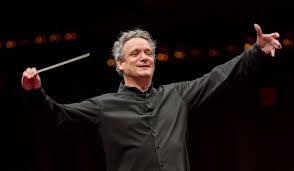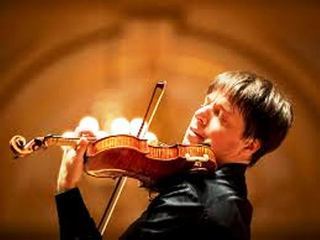|
Back
Bell and Dvorák: Czech Mates! New York
David Geffen Auditorium, Lincoln Center
08/06/2019 - & August 8, 2019
Wolfgang Amadeus Mozart: Symphony No. 38, “Prague”, K. 504
Zoltán Kodály: Dances of Galánta
Antonín Dvorák : Violin Concerto in A Minor, Opus 53
Joshua Bell (Violin)
Mostly Mozart Festival Orchestra, Louis Langrée (Conductor)

L. Langrée
“Meine Prager verstehen mich” (“My Praguers understand me)”
Wolfgang Amadeus Mozart (1768-1791)
Reasons for Mozart’s love affair with Prague are numerous. A city-wide musically-educated populace, the best wind-players in the world, no clerical or feudal approbations etc etc.
Yet anybody visiting Prague, whether in 1787 or 2019, knows by instinct is equally numinous. Mozart knew that Prague has a spirituality which depends more on cheer than Church, a city whose modesty hides a glowing pride. A capital whose artistry might lack the solemnity of Germany, but whose artists include such amiable icons as Dvorák and Milos Forman, Karel Capek, Tom Stoppard and Franz Kafka. (Yes, until his last medically suffering years, Kafka thought himself a comic writer.)
At any rate, the Mostly Mozart Festival last night (and tonight) are celebrating not only Mozart’s symphonic anthem to his favorite city but a relatively rare work by Dvorák. And even Dances from Galánta from Budapest’s Zoltán Kodály comes from the district near Slovakia, so it could be entered as a Czech countryside entertainment.
Conductor Louis Langrée, after 17 years with the Mostly Mozart Festival, has such an identity with the Festival Orchestra that one can hardly imagine a New York summer without him. (And next season he will make his premiere with the New York Philharmonic.) Still, this concert was hardly up to his splendid standards, and certainly not the best for the Mozart.
The composer obviously used all the winds possible here for the first movement, and the Festival Orchestra simply didn’t have the synchronous feeling to make it work. Certainly not in that rare introduction. I doubt if Mozart’s orchestra was perfect, but one expects more in Manhattan. Nobody blurped or wheezed, but without that perfection for such a singular introduction, one was hardly ready to become involved in the rest.
Mr. Langrée pulled them together, and by the time of the first tutti all seemed well enough, including a lovely lilting Andante (the strings were at their best). The finale was short, bucolic–yes, Mozart was never afraid to show his love), and the solo winds came back to where they have been most of this season.
It was a single wind player–Principal Clarinet John Manasse–who turned the first and last movements of Kodály’s Galánta Dances into a thing of joy. Not simply the virtuosity but those hard tones so indicative of East European and Jewish klezmer music which he offered.
Kodály is far “easier” than Bartók, who finagled with the notes. Kodály simply wanted it to be always interesting, and rhythmic and colored with the most vivid orchestration. In fact, for Mr. Langrée, it could have been painted by Ravel or Debussy. And it worked.

J. Bell
Joshua Bell has one liability for this writer. Outside of Corigliano’s Red Violin, he rarely departs from the 19th Century. So inevitably, before a Bell concert, one thinks, “Oh, not another Brahms”. “Not one more Tchaikovsky.” “Babbling Bruch again?”
Yet Joshua Bell does the improbable. Never darting from the score, never idiosyncratic, he enriches every piece he plays. It isn’t just the famous Huberman Strad heavenly tone, it’s the depth of the tone, it’s an effortlessness which is never facile, it’s a love which never departs.
Of the three Dvorák concertos, the Cello Concerto is probably the finest of the 19th Century, the Piano Concerto is the least entrancing. Last night’s Violin Concerto could well be up there with the cello work–except that the former is filled with dances, folklore, difficulty and loveliness. The Cello Concerto has the added strata of tragedy.
Mr. Bell was at his best–which means the best possible. Those long lines were played with such gorgeousness one wishes they were never stop. The highest ranges were taken with a pellucid clarity. And was he overwrought at times? Of course!!. Both in his physical movements and his coloring.
Like a large dog who jumps with affection on a stranger, who cannot love it?
The second movement is one of the greatest of the 19th Century. And that finale? I love to hear the Slavic melodies come jolting out. Mr. Bell played it a bit more “Europeanishly”, but so glorious was the playing, that one didn’t think about personal preferences.
For an encore, Joshua Bell gave us Chopin! The E Flat Nocturne arranged by the soloist and Ben Wallace. For those who believe that Chopin’s closest spiritual mentor was Bellini, this made one believe that Chopin had a 1713 Stradivarius in mind. Who needs 88 keyboard notes, when Joshua Bell has his fiddle?
Harry Rolnick
|